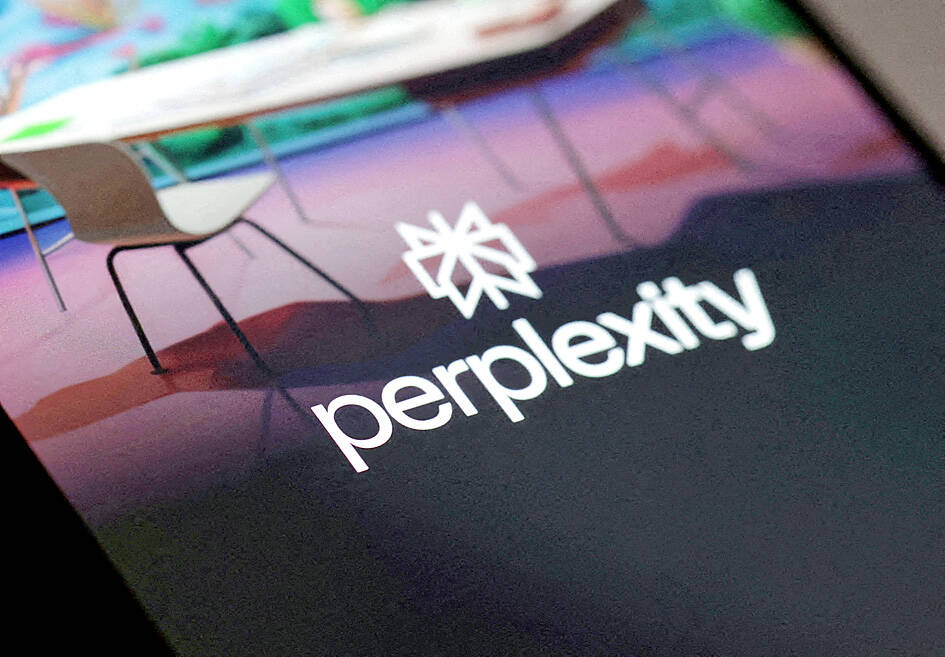US search engine start-up Perplexity AI submitted a bid on Saturday to TikTok’s Chinese parent ByteDance Ltd (字節跳動) for Perplexity to merge with TikTok US, a source familiar with the company’s plans told Reuters.
TikTok faced a US ban that started yesterday if it did not cut ties with ByteDance, although US president-elect Donald Trump on Saturday said that he would likely give the short-video social-media platform a 90-day reprieve today.
CNBC first reported the offer.

Photo: Reuters
Perplexity would merge with TikTok US and create a new entity by combining the merged company with New Capital Partners LLC, the source said.
The new structure would allow for most of ByteDance’s existing investors to retain their equity stakes and would bring more videos to Perplexity, the source said.
Perplexity believes its bid might succeed, as the proposal is a merger rather than a sale, the source said.
Perplexity’s search tools enable users to get fast answers to questions, with sources and citations. It is powered by large language models that can sum up and generate information, from OpenAI to Meta Platforms Inc’s open-source model Llama.
TikTok, which has captivated nearly half of all Americans, powered small businesses and shaped online culture, on Friday said that it would go dark in the US yesterday unless US President Joe Biden’s administration provided assurances to companies such as Apple Inc and Google that they would not face enforcement actions when a ban takes effect.

Macronix International Co (旺宏), the world’s biggest NOR flash memory supplier, yesterday said it would spend NT$22 billion (US$699.1 million) on capacity expansion this year to increase its production of mid-to-low-density memory chips as the world’s major memorychip suppliers are phasing out the market. The company said its planned capital expenditures are about 11 times higher than the NT$1.8 billion it spent on new facilities and equipment last year. A majority of this year’s outlay would be allocated to step up capacity of multi-level cell (MLC) NAND flash memory chips, which are used in embedded multimedia cards (eMMC), a managed

In Italy’s storied gold-making hubs, jewelers are reworking their designs to trim gold content as they race to blunt the effect of record prices and appeal to shoppers watching their budgets. Gold prices hit a record high on Thursday, surging near US$5,600 an ounce, more than double a year ago as geopolitical concerns and jitters over trade pushed investors toward the safe-haven asset. The rally is putting undue pressure on small artisans as they face mounting demands from customers, including international brands, to produce cheaper items, from signature pieces to wedding rings, according to interviews with four independent jewelers in Italy’s main

CULPRITS: Factors that affected the slip included falling global crude oil prices, wait-and-see consumer attitudes due to US tariffs and a different Lunar New Year holiday schedule Taiwan’s retail sales ended a nine-year growth streak last year, slipping 0.2 percent from a year earlier as uncertainty over US tariff policies affected demand for durable goods, data released on Friday by the Ministry of Economic Affairs showed. Last year’s retail sales totaled NT$4.84 trillion (US$153.27 billion), down about NT$9.5 billion, or 0.2 percent, from 2024. Despite the decline, the figure was still the second-highest annual sales total on record. Ministry statistics department deputy head Chen Yu-fang (陳玉芳) said sales of cars, motorcycles and related products, which accounted for 17.4 percent of total retail rales last year, fell NT$68.1 billion, or

In the wake of strong global demand for AI applications, Taiwan’s export-oriented economy accelerated with the composite index of economic indicators flashing the first “red” light in December for one year, indicating the economy is in booming mode, the National Development Council (NDC) said yesterday. Moreover, the index of leading indicators, which gauges the potential state of the economy over the next six months, also moved higher in December amid growing optimism over the outlook, the NDC said. In December, the index of economic indicators rose one point from a month earlier to 38, at the lower end of the “red” light.